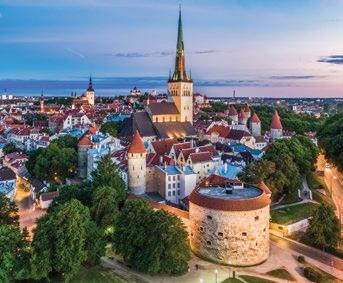
17 minute read
U.S. IMMIGRATION PATHWAYS
Exploring US immigration pathways
Shai Zamanian, US Licensed Lawyer and Migration Specialist at The American Legal Center, based in Dubai, navigates the complex world of visas and routes to US residency
Throughout the history of the United States, immigration has been integral to the nation’s growth and development, delivering economic, social, and cultural heightening.
The global movement of people in search of a brighter and better future for themselves and their families continues to drive the interconnectedness of the world. However, with time and the introduction of systematic approaches, as well as different political agendas, immigration procedures have become more complex and confusing.
Imagine you wanted to immigrate to the US today; would you know which immigration programme would be best for your family or even your career trajectory?
Most likely you would not as regulations imposed by the former Trump administration are different to those introduced by President Biden. The truth is that with so many different visa categories on offer, most people are unaware which immigration programme best suits their personal and family circumstances.
Why the move to the United States?
Understanding the reason and ultimate goal for your move will help steer you towards the best visa category aligned to your objectives. If you are moving solely for work purposes or studies, then you must explore the non-immigrant visas. These are renewable visas that limit the time you can stay in the country. They do not provide a pathway to a Green Card or citizenship but facilitate the short-term needs of an individual. However, if your main objective is to relocate your family or simply starting afresh, you should explore the immigrant visa options. These provide foreign nationals with the opportunity to obtain a US Green Card and eventually become US passport holders.
US VISA TOP FIVE
Here are the five most popular US visa pathways:
1EB-5 Immigrant Investor Visa
for Permanent Residency
This programme is ideal for families looking to move within two years or those who wish to send their children to US-based schools. It grants immediate privileges such as access to free education but does come with a price tag that not everyone can afford.
The EB-5 investor visa requires prospective investors to invest a minimum of US$500,000 into a US-approved commercial enterprise. This channel is the quickest path to US residency and provides an opportunity for citizenship. On approval of the application, investors receive a US Green Card and residency for themselves, spouse and children under the age of 21.
This is the perfect visa pathway for families looking to settle down in the US as once they obtain their Green Card, they receive the same benefits as US citizens including free public-school education, access to federal grants and scholarships, increased work opportunities and much more.
2E-2 Treaty Investor Visa
for Temporary Stay
Ideal for young entrepreneurs looking to launch their business idea or company in the US, this visa offers quick access. To participate, your country of citizenship must have a trade treaty agreement with the US. Under this visa category investors typically invest between $100,000 to $250,000 in either their own business or an existing franchise. Investors obtain a two-year renewable visa for themselves, spouse and children. While this route is cheaper than the EB-5, it does not provide for permanent residency and a Green Card. It also requires the visa be linked to the investor’s business, which means that should the business fail, the visa is cancelled. In addition, the investor is not permitted to work for another company on this visa.
3H1-B Visa for Temporary Skilled Worker Those who possess a degree that qualifies as a special occupation service are eligible for the H1-B visa. Often used by multinational companies in the technology industry, this visa allows companies to utilise external talents for the progression of their business. The basic requirement under this category is that applicants must hold a degree equivalent to a US Bachelor’s degree from an accredited university. The degree must be relevant to the specialised role for which they are applying. On approval, the applicant will hold the visa for a period of three years with an option of renewability, but no longer than six years per issuance. While under the programme, spouses and unmarried children can apply to reside in the US, however, they are required to submit a separate application to gain legal entry. 4 B1/B2 Tourist or Business Visa
without Work Authorization
The simplest way to visit and access the United States, this visa category is mostly used by tourists to stay in the country for up to six months. This temporary stay is intended for tourism or business meetings and there is no work authorisation provided with this visa category, thus you cannot apply for employment or seek government benefits as you are a temporary visitor. These visas are usually provided at nearby consulates or online using the US government Electronic System for Travel Authorization website.
5Family Petitions for Reunification
and Permanent Stay
As a matter of public policy, the United States tries to keep families together. Thus, if you have an immediate family member that is living in the US, you could ask them to petition on your behalf to allow you to reunify and grant US residency by way of this family connection. Be aware, however, that priority is provided to spouses and unmarried children as those petitions are usually approved in under one year. For parents, siblings, or other relatives, it could take many years until the petition is approved.
CLOCKWISE FROM RIGHT:
The American Legal Center specialises in the EB-5 visa; The US offers many immigration pathways; Shai Zamanian

THE AMERICAN LEGAL CENTER The American Legal Center, based in Dubai, specialises in the EB-5 visa. Its team of US licensed lawyers guides clients through the government programme administered through the United States Citizenship and Immigration Services, the agency responsible for granting visas. To date, the center has processed more than 500 Green Cards for GCC families. Visit america.ae
GEMMA GREENWOOD WORDS

From mega cities to island villages, new remote work hotspots are opening up all over the globe

DN-FRIENDLY DESTINATIONS

IMAGE BY MATTHIAS ZEITLER FROM PIXABAY T he global digital nomad community is now estimated at more than 35 million people with an economic value of some US$787 billion. If it were a country, it would rank number 41 by population size, just after Canada (37.59 million) and Morocco (36.47 million), and it would be the 38th most prosperous country based on gross national income per capita, ranking just after Portugal ($23,200 average income per person) and Saudi Arabia ($22,840).
While most like to globetrot, a recent poll of 4,000-plus digital nomads (also known as ‘DNs’), conducted by abrortherabroad.com, revealed what factors entice this community to stay put in one destination for a while.
Cost of living and fast, accessible internet were the priorities when choosing a location (56 per cent), as well as safety (15 per cent), access to nature (11 per cent) and ‘DN-friendly’ visas (9 per cent).
Mexico was hosting the most digital nomads (14 per cent) at the time of the survey (Q1 2021), while 11 per cent were in Thailand and eight per cent were in Portugal. Nine of the 10 preferred locations for digital nomads were coastal.
However, another study suggests big cities have just as much DN pulling power. The Work-from-Anywhere Index by global housing rental platform Nestpick ranked Melbourne in Australia as the best city for remote working, followed by Dubai (UAE), Sydney (Australia), Tallin (Estonia) and London (UK). Nestpick’s index ranked 75 cities around the globe on a variety of factors related to working from home, including costs and infrastructure, taxes, freedom, safety and livability.
Given the size of the DN community, the growth of which has accelerated in the wake of the pandemic, more than 21 countries have created a digital nomad visa or launched a programme targeting digital nomads, while 28 countries offer visas that are DN-friendly, valid for six months or more.
Travel insurance comparison site InsureMyTrip recently examined data for countries with remote working visas to assess which ones offered the best and worst opportunities for digital nomads.
The study analysed categories including internet access and speed, apartment rental costs, language difficulty, openness to digital nomads, cost and access to a work visa and length of the remote working visa.
Norway ranked first scoring 7.88 out of a possible 10. Its highest scores were for length of remote working visa (10), nomad acceptance (9.1), happiness (9.9) and internet speed (7.4). The top nine ranking countries after Norway were Mexico, Germany, Portugal, Iceland, Greece, Costa Rica, Jamaica, Spain and Bermuda respectively.
Norway, along with Portugal and Greece, are three countries that do not limit a worker’s stay on a remote working visa and allow an indefinite stay as long as the necessary requirements are met.
The UAE scored well for the cost of its remote work visa (8.57), which is significantly cheaper than more expensive countries like Antigua and Barbados.
Perhaps one of the most comprehensive resources for current or would-be digital nomads is nomadlist.com, which provides detailed rankings across multiple criteria, guides, reviews and much more. Factors considered include quality of life, happiness, education, healthcare, life expectancy, gender equality, cost of living and even the weather.
Its list of fastest-growing remote work hubs in 2021, based on check-ins to places made by tens of thousands of Nomad List members using live data (136,083 check-ins), reveals Mexico remains a hotspot, with Cancun ranking first, Playa del Carmen ranking second, Tulum ranking fifth and Mexico City ranking seventh. In third and fourth place are Tenerife (Canary Islands) and Dubai (UAE) respectively, while Miami (US), Split (Croatia), Medellin (Colombia) and Denver (US) also rank in the top 10 at sixth, eighth, ninth and tenth place respectively.
“Remote work is now on an exponential trajectory and growing fast,” says Nomad List. “With its growth, thousands of destinations, from tiny surf villages to cosmopolitan mega cities, are now competing to attract remote workers.”
Here, Business Traveller takes a glance at three new remote work hotspots for 2021.
MADEIRA
Europe’s rst dedicated digital nomad village opened in Madeira – one of two autonomous regions of Portugal – in February this year.
Digital Nomads Madeira is located in the village of Ponta do Sol on the volcanic island’s south coast and o ers remote workers a ra of bene ts including a free workspace with desk and chair at the John Do Passos Cultural Centre, access to a Slack community, plus complimentary Wi-Fi from 8am to 10pm daily. e project, developed by the Regional Government of Madeira through Startup Madeira and with the help of a digital nomad consultant, has also teamed up with local businesses such as real estate companies, hotels, and rental car rms to provide essential services to visiting nomads. ere is no charge to use the co-working space and be part of the community, but a minimum one-month stay is required.
According to Digital Nomads Madeira, Ponta do Sol o ers the “perfect conditions for nomads looking for warm weather, sun, and a peaceful lifestyle surrounded by nature”. e programme also includes events and activities to facilitate connections between digital nomads and the local community. Digital Nomads Madeira can host 100 nomads and is bookable online. e Madeira islands were voted the World’s Leading Island Destination for the sixth consecutive year at the World Travel Awards 2020. e region is also working with SGS to ensure all tourism businesses adhere to strict health and safety measures to minimise the risk of the spread of COVID19. A certi cation process, available to all companies in the tourism sector, is identi able under the ‘Madeira Safe to Discover’ label. In addition, most companies have adopted the ‘Clean & Safe’ stamp created by VisitPortugal. e creation of a DN village at Ponta do Sol has started a trend in Madeira, which is an archipelago of four islands, and now, a team of local entrepreneurs in Santa Cruz – known for its beaches and diving spots – are developing HubRemotely, a new workspace for digital nomads.
New co-working spaces are also popping up in Madeira’s capital, Funchal, as this island nation sets its sights on wooing remote workers. Cowork Funchal (coworkfunchal.com) is currently o ering a 10 per cent discount for visiting digital nomads.
digitalnomads.startupmadeira.eu



ABOVE: Ponta do Sol is home to Digital Nomads Madeira LEFT: Cape Town is emerging as a global tech start-up hub
CAPE TOWN
Another up-and-coming DN-friendly destination is Cape Town, which recently launched its Digital Nomad Remote Working campaign. e South African city was ranked number 16 in the Nestpick Workfrom-Anywhere Index, recognised for its low cost of living, good weather and the rights a orded to its citizens. Co-working space quality and variety, expat-friendliness and spectacular nature are also key selling points, as noted by Nomad List, while the city has received the Safe Travels Stamp from the World Travel and Tourism Council (WTTC).
Having identi ed the opportunity to attract digital nomads, the city’s mayoral committee member for economic opportunities and asset management, James Vos, is lobbying the government to introduce a remote work visa with a lifespan of more than three months.
If you’re an ITC solutions professional or investor in the sector, Cape Town is more than ‘one to watch’.
In 2020, some US$88 million was ploughed into tech start-ups in the city – “the highest investments made in South Africa during the period” – according to Wesgro, the o cial tourism, trade and investment promotion agency for Cape Town and the Western Cape.
Already home to heavyweights such as Naspers, Takealot, Aerobotics, Clickatell, GetSmarter, Yoco and Sweepsouth, Cape Town’s tech ecosystem keeps expanding, with US retail giant Amazon now poised to boost its presence. It recently announced plans to set up its headquarters in a new mega R4 billion ($270 million) mixed-use development with commercial and residential components.
Regularly ranked among the “top emerging start-up ecosystems” as well as “top tech employment hubs”, Cape Town is now counted among the fastest-growing regions for foreign direct investment (FDI), suggests Wesgro. e Cape Town-Stellenbosch corridor plays host to 450 tech rms employing more than 40,000 people, an ecosystem larger than those of Nairobi and Lagos combined. It is also favoured by venture capitalists, with the Western Cape accounting for the highest number of VC rms in the country.
Wesgro highlights that Cape Town’s co-working spaces, developer talent, edtech hubs and digital skills training academies, universities, as well as ease of doing business, make it a top contender for Africa’s tech capital status. e city also hosts 38 per cent of total developers in South Africa.
Add to the mix the Western Cape’s 30-plus co-working spaces – the highest number in Africa – and the 715 free Wi-Fi spots in Cape Town alone, and this is a remote work hotspot for techpreneurs in the making. capetown.travel

DUBAI
Since launching its virtual remote working programme in October 2020, Dubai has risen through the ranks to become the second most popular city destination globally for digital nomads, according to the Nestpick Work-from-Anywhere Index. e city was recognised for its 0 per cent income tax, favourable legislation, robust infrastructure, livability and even its high COVID-19 vaccination rate.
Another study by resume.oi, a Netherlands-based CV-building platform, found Dubai was the most popular beach city for digital nomads, with 27,007 Instagram users tagging #digitalnomad on their posts. e analysis of 90,000 @digitalnomad posts also found the emirate was the second most popular destination in the Middle East and Central Asia.
“Dubai is a great place for digital nomads to stay while globetrotting,” resume.io said. “It’s one of the only places on the list to have a virtual working visa, allowing people access to schools, utilities and more.”
Dubai, and the UAE, have been recognised for setting a global model for dealing with COVID-19. e emirate, which opened to international tourists on July 7, 2020 – one of the rst globally to do so successfully in the wake of the pandemic – has implemented robust safety and hygiene protocols that enabled the reopening of most sectors and destination o erings across the city, including hotels, restaurants, attractions, water and theme parks, beaches, shopping malls and schools and universities e World Travel & Tourism Council (WTTC) awarded Dubai the Safe Travels Stamp in acknowledgement of its e orts to ensure the highest standards of hygiene and COVID-19 precautionary measures. e emirate also introduced the ‘Dubai Assured’ stamp to certify that establishments have implemented all public health protocols for the prevention and management of COVID-19. e virtual working programme, valid for one year, is priced $611 and grants access to the services available to all residents, including telecoms, banking, utilities, education and accommodation. At the same time, many hotel groups are o ering favourable remote work packages including complimentary Wi-Fi, laundry, discounted F&B and car rental, and more. To be eligible for the Dubai programme you must earn at least $5,000 per month.
Like Cape Town, Dubai has set its sights on growing its tech sector and in July this year, the government launched the Dubai Chamber of Digital Economy, charged with the task of transforming the emirate into a global technology hub and attracting investment in e-commerce and emerging technologies.

Members of the chamber’s board include founders of local success stories such as Careem, Souq.com, Bayt.com and Propertyfi nder.
It is part of a new three-chamber structure, which also comprises Dubai Chamber of Commerce and Dubai Chamber of International Trade.
During the board’s fi rst meeting it announced a roadmap with the aim of accelerating the growth of Dubai’s digital economy and doubling the number of digital companies operating in the emirate in the coming years.
“Th is roadmap will elevate Dubai’s position as a global leader in digital economy, and attract specialised talent, leading companies and new investments to the market. Homegrown success stories such as Careem and Souq have boosted Dubai’s appeal as a hub for e-commerce and digital economy, and we hope to raise the bar even higher by attracting other global players that can support the emirate’s digital economy ambitions and innovation ecosystem,” says H.E. Omar bin Sultan Al Olama, Chairman of Dubai Chamber of Digital Economy.
Th e formation of three chambers of commerce is aimed at supporting international trade and the digital economy and a fi ve-year plan to increase Dubai’s foreign trade from AED 1.4 trillion ($382 billion) to AED 2 trillion ($545 billion) over the next fi ve years.
visitdubai.com

DN VISA TOP 10
1. Antigua & Barbuda o ers the Nomad Digital Residence (NDR) visa for two years, priced $1,500 for one person, $2,000 for a couple and $3,000 for a family of three or more (antiguanomadresidence.com) 2. The Barbados Welcome Stamp is a 12-month visa for remote workers that can be renewed and is priced $2,000. (barbadoswelcomestamp.bb) 3. The Work from Bermuda visa, an expansion of the former residency programme, allows you to stay for up to a year and is priced just $263. 4. The Cayman Islands has launched the Global Citizen Certificate (GCC) permitting travellers to stay for up to two years. The application price is $1,469. (visitcaymanislands.com) 5. Dubai’s virtual working programme, valid for one year, is priced $611 inclusive of application fees, processing costs, medical and Emirates ID. (visitdubai.com) 6. Estonia o ers a one-year digital nomad and freelancer visa. There are two types of digital nomad visas: Type C (short stay) costs €80, and Type D (long stay) costs €100. (e-resident.gov.ee/nomadvisa/)
Tallinn, Estonia
7. Malta has launched a Digital Nomad Residence Permit specifically targeting remote workers from outside the EU, luring them with its weather and strong internet infrastructure (including nationwide 5G service). The visa admin fee is €300. (residencymalta.gov.mt) 8. Mauritius is o ering a free one-year Premium Visa. There’s no catch – you just need to produce proof of your long stay plans and su icient travel and health insurance during your stay. (edbmauritius.org/premium-visa) 9. DN hotspot Mexico o ers a six-month tourist visa and a Temporary Resident Visa valid for one year and renewable for another three. (consulmex.sre.gob.mx) 10. Portugal o ers a temporary resident visa (D7 passive income visa) and a residence permit for independent workers and entrepreneurs visa for one year. It can be renewed for up to five years and after that, you can apply for permanent residency. (vistos.mne.gov.pt)
Note that terms and conditions do apply to these visas, some of which include minimum salary requirements. (Source: expertvagabond.com)










